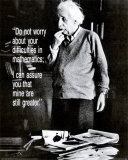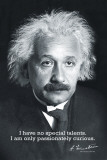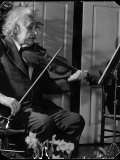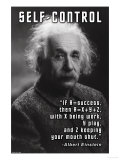|
|||||||||||||||
|
|
|||||||||||||||
|
|||||||||||||||
|
|
|||||||||||||||
|
|||||||||||||||
|
|
|||||||||||||||
|
|||||||||||||||
|
|
|||||||||||||||
 |
|||||||||||||||
|
|
|||||||||||||||
QUOTES INDEX PAGE
|
|
EINSTEIN POSTERS | EINSTEIN BOOKS | VIDEOS | LINKS for LEARNING |
“I believe in intuition and inspiration. … At times I feel certain I am right while not knowing the reason. When the eclipse of 1919 confirmed my intuition, I was not in the least surprised. In fact I would have been astonished had it turned out otherwise. Imagination is more important than knowledge. For knowledge is limited, whereas imagination embraces the entire world, stimulating progress, giving birth to evolution. It is, strictly speaking, a real factor in scientific research.” “A hundred times every day I remind myself that my inner and outer life are based on the labors of other men, living and dead, and that I must exert myself in order to give in the same measure as I have received and am still receiving... .” “Nature shows us only the tail of the lion. But there is no doubt in my mind that the lion belongs with it even if he cannot reveal himself to the eye all at once because of his huge dimension.” “Concepts that have proven useful in ordering things easily achieve such authority over us that we forget their earthly origins and accept them as unalterable givens.” “To punish me for my contempt of authority, Fate has made me an authority myself.” “[I do not] carry such information in my mind since it is readily available in books. ...The value of a college education is not the learning of many facts but the training of the mind to think.” “Subtle is the Lord, but malicious He is not.” “Try and penetrate with our limited means the secrets of nature and you will find that, behind all the discernible concatenations, there remains something subtle, intangible and inexplicable. Veneration for this force beyond anything that we can comprehend is my religion. To that extent I am, in point of fact, religious.” “Life is like riding a bicycle. To keep your balance you must keep moving.” “Peace cannot be kept by force. It can only be achieved by understanding. You cannot subjugate a nation forcibly unless you wipe out every man, woman, and child. Unless you wish to use such drastic measures, you must find a way of settling your disputes without resort to arms.” “You cannot simultaneously prevent and prepare for war.” “Why does this magnificent applied science which saves work and makes life easier bring us so little happiness? The simple answer runs: Because we have not yet learned to make sensible use of it.” “Only a life lived for others is a life worthwhile.” “It can scarcely be denied that the supreme goal of all theory is to make the irreducible basic elements as simple and as few as possible without having to surrender the adequate representation of a single datum of experience.” “One may say "the eternal mystery of the world is its comprehensibility.” “Great spirits have always encountered violent opposition from mediocre minds. The mediocre mind is incapable of understanding the man who refuses to bow blindly to conventional prejudices and chooses instead to express his opinions courageously and honestly.” “All religions, arts and sciences are branches of the same tree. All these aspirations are directed toward ennobling man's life, lifting it from the sphere of mere physical existence and leading the individual towards freedom.” “Physical concepts are free creations of the human mind, and are not, however it may seem, uniquely determined by the external world. In our endeavor to understand reality we are somewhat like a man trying to understand the mechanism of a closed watch. He sees the face and the moving hands, even hears its ticking, but he has no way of opening the case. If he is ingenious he may form some picture of a mechanism which could be responsible for all the things he observes, but he may never be quite sure his picture is the only one which could explain his observations. He will never be able to compare his picture with the real mechanism and he cannot even imagine the possibility or the meaning of such a comparison. But he certainly believes that, as his knowledge increases, his picture of reality will become simpler and simpler and will explain a wider and wider range of his sensuous impressions. He may also believe in the existence of the ideal limit of knowledge and that it is approached by the human mind. He may call this ideal limit the objective truth.” “Perfection of means and confusion of goals seem — in my opinion — to characterize our age.” “Do not worry about your difficulties in Mathematics. I can assure you mine are still greater.” “So many people today — and even professional scientists — seem to me like someone who has seen thousands of trees but has never seen a forest. A knowledge of the historic and philosophical background gives that kind of independence from prejudices of his generation from which most scientists are suffering. This independence created by philosophical insight is — in my opinion — the mark of distinction between a mere artisan or specialist and a real seeker after truth.” “A new type of thinking is essential if mankind is to survive and move toward higher levels.” • “Invention is not the product of logical thought, even though the final product is tied to a logical structure.” • “Why does this magnificent applied science which saves work and makes life easier bring us so little happiness? The simple answer runs: Because we have not yet learned to make sensible use of it.” “The release of atomic energy has not created a new problem. It has merely made more urgent the necessary solving of an existing one.” “Never do anything against conscience even if the state demands it.” “A human being is a part of the whole, called by us "Universe", a part limited in time and space. He experiences himself, his thoughts and feelings as something separated from the rest — a kind of optical delusion of his consciousness. This delusion is a kind of prison for us, restricting us to our personal desires and to affection for a few persons nearest to us. Our task must be to free ourselves from this prison by widening our circle of compassion to embrace all living creatures and the whole of nature in its beauty. Nobody is able to achieve this completely, but the striving for such achievement is in itself a part of the liberation and a foundation for inner security.” “I think that only daring speculation can lead us further and not accumulation of facts.” “... the world is in greater peril from those who tolerate or encourage evil than from those who actually commit it.” “The important thing is not to stop questioning; curiosity has its own reason for existing.” “Invention is not the product of logical thought, even though the final product is tied to a logical structure.” “When a man sits with a pretty girl for an hour, it seems like a minute. But let him sit on a hot stove for a minute and it's longer than any hour. That's relativity.”
“If I were not a physicist, I would probably be a musician. I often think in music. I live my daydreams in music. I see my life in terms of music. ... I cannot tell if I would have done any creative work of importance in music, but I do know that I get most joy in life out of my violin.” “He who joyfully marches to music in rank and file has already earned my contempt. He has been given a large brain by mistake, since for him the spinal cord would suffice. This disgrace to civilisation should be done away with at once. Heroism at command, senseless brutality, deplorable love-of-country stance, how violently I hate all this, how dispicable and ignoble war is; I would rather be torn to shreds than be a part of so base an action! It is my convictin that killing under the cloak of war is nothing but an act of murder.”” “I have never looked upon ease and happiness as ends in themselves — this critical basis I call the ideal of a pigsty. The ideals that have lighted my way, and time after time have given me new courage to face life cheerfully, have been Kindness, Beauty, and Truth.” “My political ideal is democracy. Let every man be respected as an individual and no man idolized. It is an irony of fate that I myself have been the recipient of excessive admiration and reverence from my fellow-beings, through no fault, and no merit, of my own. The cause of this may well be the desire, unattainable for many, to understand the few ideas to which I have with my feeble powers attained through ceaseless struggle. I am quite aware that for any organization to reach its goals, one man must do the thinking and directing and generally bear the responsibility. But the led must not be coerced, they must be able to choose their leader.” “This crippling of individuals I consider the worst evil of capitalism. Our whole educational system suffers from this evil. An exaggerated competitive attitude is inculcated into the student, who is trained to worship acquisitive success as a preparation for his future career. I am convinced there is only one way to eliminate these grave evils, namely through the establishment of a socialist economy, accompanied by a educational system which would be oriented toward social goals. In such an economy, the means of production are owned by society itself and are utilised in a planned fashion. A planned economy, which adjusts production to the needs of the community, would distribute the work to be done among all those able to work and would guarantee a livelihood to every man, woman and child. The education of the individual, in addition to promoting his own innate abilities, would attempt to develop in him a sense of responsibility for his fellow-men in place of the glorification of power and success in our present society.” ~ On Education, 1949 “Somebody who only reads newspapers and at best books of contemporary authors looks to me like an extremely near-sighted person who scorns eyeglasses. He is completely dependent on the prejudices and fashions of his times, since he never gets to see or hear anything else. And what a person thinks on his own without being stimulated by the thoughts and experiences of other people is even in the best case rather paltry and monotonous. “My dear children: I rejoice to see you before me today, happy youth of a sunny and fortunate land. Bear in mind that the wonderful things that you learn in your schools are the work of many generations, produced by enthusiastic effort and infinite labour in every country of the world. All this is put into your hands as your inheritance in order that you may receive it, honour it, and add to it, and one day faithfully hand it on to your children. Thus do we mortals achieve immortality in the permanent things which we create in common. If you always keep that in mind you will find meaning in life and work and acquire the right attitude towards other nations and ages.” ~ talking to a group of school children, 1934 “I believe, indeed, that overemphasis on the purely intellectual attitude, often directed solely to the practical and factual, in our education, has led directly to the impairment of ethical values. I am not thinking so much of the dangers with which technical progress has directly confronted mankind, as of the stifling of mutual human considerations by a ‘matter-of-fact’ habit of thought which has come to lie like a killing frost upon human relations. Without ‘ethical culture’ there is no salvation for humanity.” ~ 1953 “The development of science and of the creative activities of the spirit in general requires still another kind of freedom, which may be characterised as inward freedom. It is this freedom of spirit which consists in the independence of thought from the restrictions of authoritarian and social prejudices as well as from unphilosophical routinizing and habit in general. This inward freedom is an infrequent gift of nature and a worthy objective for the individual. ...schools may favor such freedom by encouraging independent thought. Only if outward and inner freedom are constantly and consciously pursued is there a possibility of spiritual development and perfection and thus of improving man's outward and inner life. ” ~ 1954 “Numerous are the academic chairs, but rare are wise and noble teachers. Numerous and large are the lecture halls, but far from numerous the young people who genuinely thirst for truth and justice. Numerous are the wares that nature produces by the dozen, but her choice products are few. “The school has always been the most important means of transferring the wealth of tradition from one generation to the next. This applies today in an even higher degree than in former times, for through modern development of the economic life, the family as bearer of tradition and education has been weakened. The continuance and health of human society is therefore in a still higher degree dependent on the school than formerly.” Sometimes one sees in the school simply the instrument for transferring a certain maximum quantity of knowledge to the growing generation. But that is not right. Knowledge is dead; the school however, serves the living. It should develop in the young individuals those qualities and capabilities which are of value for the welfare of the commonwealth. But that does not mean that individuality should be destroyed and the individual become a mere tool of the community, like a bee or an ant. For a community of standardised individuals without personal originality and personal aims would be a poor community without possibilities for development. On the contrary, the aim must be the training of independently acting and thinking individuals, who, however, see in the service of the community their highest life problem.” To me the worst thing seems to be for a school principally to work with methods of fear, force and artificial authority. Such treatment destroys the sound sentiments, the sincerity, and the self-confidence of the pupil. It produces the submissive subject. it is no wonder that such schools are the rule in Germany and Russia. ...the desire for the approval of one's fellow-man certainly is one of the most important binding powers of society. In this complex of feelings, constructive and destructive forces lie closely together. Desire for approval and recognition is a healthy motive; but the desire to be acknowledged as better, stronger, or more intelligent than a fellow being or scholar easily leads to an excessively egoistic psychological adjustment, which may become injurious for the individual and for the community. Therefore the school and the teacher must guard against employing the easy method of creating individual ambition, in order to induce the pupils to diligent work.”
“It is, in fact, nothing short of a miracle that the modern methods of instruction have not yet entirely strangled the holy curiosity of inquiry; for this delicate little planet, aside from stimulation, stands mainly in need of freedom; without this it goes to wreck and ruin without fail. It is a grave mistake to think that the enjoyment of seeing and searching can be prompted by means of coercion and a sense of duty. On the contrary, I believe that it would be possible to rob even a healthy beast of prey of its voraciousness, if it were possible, with the aid of a whip, to force the beast to devour continuously, even when not hungry, especially if the food handed out under such coercion were to be selected accordingly.” “I cannot imagine a God who rewards and punishes the objects of his creation, whose purposes are modeled after our own — a God, in short, who is but a reflection of human frailty. Neither can I believe that the individual survives the death of his body, although feeble souls harbor such thoughts through fear or ridiculous egotisms.” “I do not believe in freedom of the will. Schopenhauer's words: “Man can do what he wants, but he cannot will what he wills” accompany me in all situations throughout my life and reconcile me with the actions of others even if they are rather painful to me. This awareness of the lack of freedom of will preserves me from taking too seriously myself and my fellow men as acting and deciding individuals and from losing my temper.” “The most beautiful and deepest experience a man can have is the sense of the mysterious. It is the underlying principle of religion as well as all serious endeavor in art and science. He who never had this experience seems to me, if not dead, then at least blind.” “It would not be difficult to come to an agreement as to what we understand by science. Science is the century-old endeavor to bring together by means of systematic thought the perceptible phenomena of this world into as thoroughgoing an association as possible.” “I want to know how God created this world. I'm not interested in this or that phenomenon, in the spectrum of this or that element. I want to know His thoughts, the rest are details.” “The bigotry of the nonbeliever is for me nearly as funny as the bigotry of the believer.” “One has a feeling that one has a kind of home in this timeless community of human beings that strive for truth. … I have always believed that Jesus meant by the Kingdom of God the small group scattered all through time of intellectually and ethically valuable people.” “In the judgment of the most competent living mathematicians, Fräulein Noether was the most significant creative mathematical genius thus far produced since the higher education of women began.” “Pure mathematics is, in its way, the poetry of logical ideas. One seeks the most general ideas of operation which will bring together in simple, logical and unified form the largest possible circle of formal relationships. In this effort toward logical beauty spiritual formulas are discovered necessary for the deeper penetration into the laws of nature.” “Generations to come, it may well be, will scarce believe that such a man as this one ever in flesh and blood walked upon this Earth.” ~ talking about Gandhi
|
||||||||||||||||||
|
EINSTEIN POSTERS | EINSTEIN BOOKS | VIDEOS | LINKS for LEARNING |
|
NPW home | Global PathMarker Collection | APWTW Blog | faqs-about | contact | search | privacy |
|
NetPosterWorks.com ©2007-2015 The Creative Process, LLC All Rights Reserved. |
last updated













